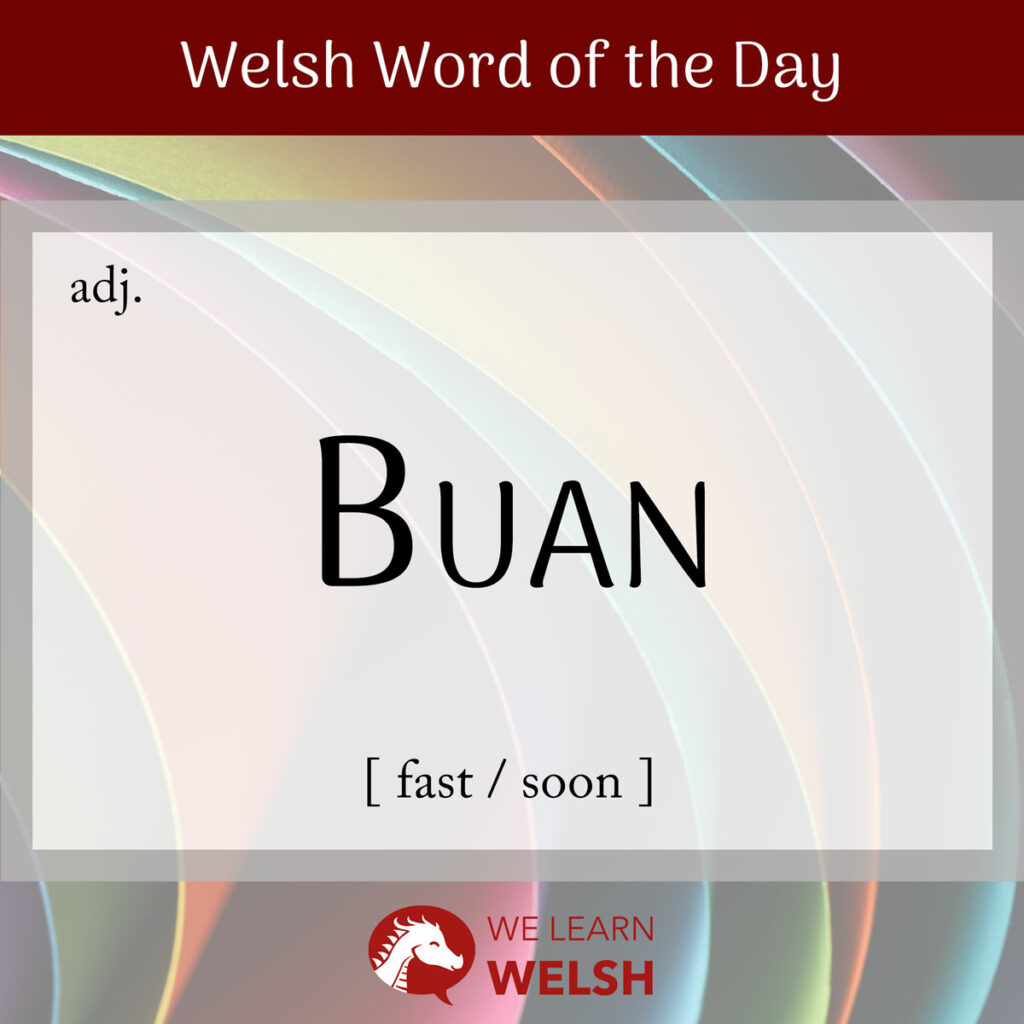Today’s topic is another one that you’re more likely to have encountered in its mutated than its original form. It sounds quite cool before you remember you’re talking about linguistics, doesn’t it? 😉
buan
fast / prompt
Our Welsh word of the day is buan, usually rendered yn fuan.
Technically, buan is an adjective which means fast or prompt. It’s a cognate of a Breton word meaning exactly the same thing. The etymology of these words is unclear, but they likely come from a proto-Celtic word that might have looked something like *biwonos.
But the meaning you will most often find buan being used for is soon. To have it convey this, you need to turn it into an adverb by adding the particle yn – so yn fuan, soon.
Of course, here buan has undergone a soft mutation. This is actually one of two mutations that it is theoretically susceptible to, although I can’t think of any situations in which it would actually undergo the nasal mutation, which normally only affects nouns. Still, here are both mutations that buan could technically undergo.
Soft mutation
fuan
Nasal mutation
muan
Aspirate mutation
N/A
There are actually quite a lot of ways to say soon in Welsh. You could choose from:
- cyn bo hir
- yn y man
- yn sydyn
- ar fyr o dro
- ymhen fawr o dro
- gyda hyn
- toc (as in ta ta tan toc, a playful way to say see you later)
These are all the sorts of things that vary a great deal regionally. So choose a phrase you enjoy and stick with it! Personally, I would usually say yn fuan or cyn bo hir, but I wouldn’t blink at any of the other phrases listed.
To ask how soon, use pa mor fuan. If you were saying specifically soon after, you could use yn fuan wedi hynny (soon after that) or yn fuan wedyn (soon then), or you could opt for ychydig ar ôl hynny (a little after that).
One phrase in which buan does turn up in its original form is yn eitha(f) buan (quite soon, soonish). Here, the adverb eithaf is blocking the yn from causing buan to mutate. That being said, it’s common to hear Welsh speakers using fuan instead of buan here, simply because everyone is more used to saying fuan than buan.
Bydda i’n cyrraedd yn eitha(f) buan.
I’ll arrive quite soon.
Although buan on its own means fast, it’s not normally used this way in modern standard Welsh. Instead, people usually say cyflym, or sometimes sydyn – though the latter, like buan, more often turns up in adverbial phrases.
Still, buan’s historical meaning of fast persists in other ways. For example, the bird known as a swift in English is sometimes called a gwennol fuan (fast swallow) in Welsh, although gwennol ddu (black swallow) is more common. Or, in very old-fashioned Welsh writing, you could come across buanedd instead of cyflymder to mean speed as a noun. And in North Wales some people use the quite charming phrase yn fân ac yn fuan to describe someone moving by taking very quick, small steps.
Buan / fuan is pretty interchangeable with cynnar (early) in Welsh. For example, whether you use rhy fuan or rhy gynnar (too soon / too early) is definitely a matter of preference.
Oes rhaid i ti adael mor fuan?
Do you have to leave so soon?
And although there are comparative forms of buan, they are usually disregarded in favour of the comparative forms of cynnar. So sooner is usually cynt rather than buanach, soonest is usually cyntaf rather than buanaf, and as soon as is usually cyn gynted â rather than cyn fuaned â.
For example, although you could say mor fuan â phosib (as soon as possible), you would be far more likely to go for cyn gynted â phosib. (Phosib is a shortened version of phosibl, meaning possible. People almost always drop the ‘l’ when speaking.)
Another way in which soon in Welsh transitions into early is through the use of yn fuan, which is the preferred term to describe a timepiece that is fast (i.e., ahead of time). While there are other options—such as ffest, ar flaen, or yn ennill—yn fuan is the most standard. I could probably use an oriawr (watch) that runs yn fuan, because despite my best efforts, I’m rarely cynnar when it comes to arriving places on time!


